

The economist - Lifelong learning (special reports) FHNW - Prof. Dr. Ulla Klingovsky - Publikationen - Veröffentlichungen - Institut Weiterbildung und Beratung - Fachhochschule Nordwestschweiz. What Employers Want — The Synapse. There is no shortage of articles exposing the skills employers want from young workers but can’t find.
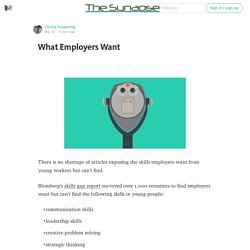
Blomberg’s skills gap report surveyed over 1,000 recruiters to find employers want but can’t find the following skills in young people: communication skillsleadership skillscreative problem solvingstrategic thinking Ernest J. Wilson III’s recent article for Fortune explored the needs of almost 2,000 executives to find the following skills that companies need but can’t find from recent graduates: intellectual curiosity360-degree thinkingcultural competenceempathyadaptability The Economist’s Zoe Tabary (@zoetabary) wrote a piece on their survey of global business execs, teachers, and students that found the following were skills needed but lacking in young people (Google’s Chief Edu Evangelist Jaime Casap — @jcasap — also cited this article recently): problem solvingteam workingcommunicationcritical thinkingcreativityleadership I could go on, but I think we get the point.
Manifesto for Adult Learning in the 21st Century - European Association for the Education of Adults. As a tool for change, EAEA has published 'Manifesto for Adult Learning in the 21st Century'.
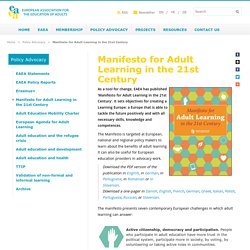
It sets objectives for creating a Learning Europe: a Europe that is able to tackle the future positively and with all necessary skills, knowledge and competences. The Manifesto is targeted at European, national and regional policy makers to learn about the benefits of adult learning. It can also be useful for European education providers in advocacy work. Digitalisierung in der Erwachsenenbildung. 80 Prozent der Deutschen sind laut ARD/ZDF-Onlinestudie 2015 online.
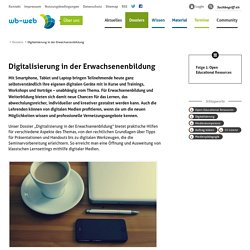
Unter den Berufstätigen sind es sogar 93 Prozent. Universal Design for Learning (UDL) Use of technology to enhance learning, teaching and assessment should be considered and appropriate, and should never exclude any learner from engaging in the process.
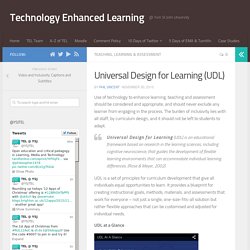
The burden of inclusivity lies with all staff, by curriculum design, and it should not be left to students to adapt. Universal Design for Learning (UDL) is an educational framework based on research in the learning sciences, including cognitive neuroscience, that guides the development of flexible learning environments that can accommodate individual learning differences. (Rose & Meyer, 2002) UDL is a set of principles for curriculum development that give all individuals equal opportunities to learn. E-inclusion - Netzwerk Digitale Inklusion Schweiz. Data Report 2013-2015: Informal Learners – OER Hub. In 2013 the Hewlett-funded OER Research Hub Project created a bank of survey questions to test eleven hypotheses related to the impact of OER use on teaching and learning.
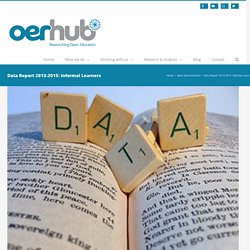
In the two years that followed, a number of bespoke surveys were designed and administered in collaboration with the Flipped Learning Network, Vital Signs, the Community Colleges Consortium for Open Educational Resources, OpenLearn, Saylor Academy, OpenStax, BCcampus, Siyavula, School of Open-P2PU and CoPILOT. Responses from each survey were then combined into a larger dataset to allow for comparison and in-depth examination. The final dataset is comprised of 7,498 cases –44.4% informal learners, 28.4% formal learners, 24.3% educators and 2.9% librarians.
The current report, first in a series of three, presents a frequencies analysis of responses from informal learners, i.e. those learners not registered on a course of study at an educational institution. Some key findings: Featured Image by janneke staaks CC BY-NC 2.0. Learning Spaces (Hochscule Medien Stuttgart) - Literatur & Datenbank. Spachenübergreifendes Forschungsprojekt stellt Lernraumkonzepte und -begriffe gegenüber von Stefan Volkmann.
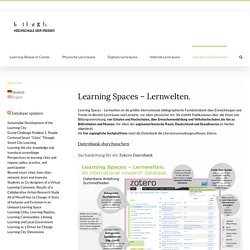
Learn.Unlearn.Relearn.: April 2015. From when I was young, I remember a conversation between my Dad and my Uncle Keith.
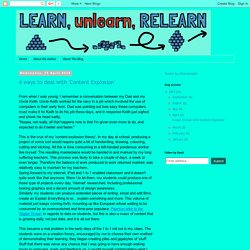
Uncle Keith worked for the navy in a job which involved the use of computers in their early form. Dad was pointing out how easy these computers must make it for Keith to do his job these days, and in response Keith just sighed and shook his head sadly, "Naaaa, not really, all that happens now is that I'm given even more to do, and expected to do it better and faster. " This is the crux of my 'content explosion theory'. In my day at school, producing a project of some sort would require quite a bit of handwriting, drawing, colouring, cutting and sticking. Spring forward to my internet, iPad and 1 to 1 enabled classroom and it doesn't quite work like that anymore. Untitled.
European lifelong learning magazine - Elm - European lifelong learning magazine. Infed.org - learning, education and community. Featured Updated: What is a group?
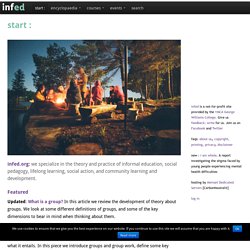
In this article we review the development of theory about groups. We look at some different definitions of groups, and some of the key dimensions to bear in mind when thinking about them. Updated: What is group work? While many practitioners may describe what they do as ‘groupwork’, they often have only a limited appreciation of what groupwork is and what it entails. Updated: What is teaching? Webportal für Lehrende in EB/WB. Heutagogy and lifelong learning: A review of heutagogical practice and self-determined learning. Lisa Marie Blaschke Oldenburg University and University of Maryland University College (UMUC) Abstract Heutagogy, a form of self-determined learning with practices and principles rooted in andragogy, has recently resurfaced as a learning approach after a decade of limited attention.
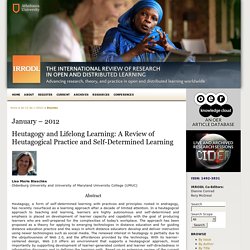
In a heutagogical approach to teaching and learning, learners are highly autonomous and self-determined and emphasis is placed on development of learner capacity and capability with the goal of producing learners who are well-prepared for the complexities of today’s workplace. The approach has been proposed as a theory for applying to emerging technologies in distance education and for guiding distance education practice and the ways in which distance educators develop and deliver instruction using newer technologies such as social media. The renewed interest in heutagogy is partially due to the ubiquitousness of Web 2.0, and the affordances provided by the technology. Introduction Research Method Conclusion. Ermöglichungsdidaktik. Ein Lernmodell, das Rolf Arnold für die Umsetzung der Ermöglichungsdidaktik entwickelte, ist LENA.
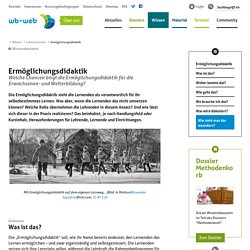
„LENA – lebendiges und nachhaltiges Lernen“ entstand in der Zusammenarbeit mit dem Wirtschaftsförderungsinstitut Österreich (WIFI). Research Report Americans and Lifelong Learning and Technology. A large majority of Americans seek extra knowledge for personal and work-related reasons. Digital technology plays a notable role in these knowledge pursuits, but place-based learning remains vital to many and differences in education and income are a hallmark of people’s learning activities Most Americans feel they are lifelong learners, whether that means gathering knowledge for “do it yourself” projects, reading up on a personal interest or improving their job skills.
Aus- und Weiterbildung: Wissen wird wichtiger - NZZ Unternehmen. Banken müssen mehr tun, um ihre Kunden zufriedenzustellen. Der Übergang zu einer Weissgeldstrategie, die Flut an regulatorischen Vorgaben, die Digitalisierung des Bankgeschäfts, das Niedrigzinsumfeld – nur wer echte Performance generiert und qualitativ hochstehende Dienstleistungen anbieten kann, hat als Bank Aussicht auf längerfristigen Erfolg.
Die Kunden sind in einer zusehends digitalen Welt immer besser informiert, stellen Vergleiche an und wechseln zur Konkurrenz, wenn das Angebot nicht stimmt. Vor diesem Hintergrund ist die Aus- und Weiterbildung der Mitarbeiter und Führungskräfte für jede Bank von eminenter Bedeutung. An der Schnittstelle Das interne und externe Angebot an Ausbildungsmöglichkeiten ist umfangreich. Die beiden Grossbanken UBS und Credit Suisse, aber auch die Kantonalbanken halten ihre Berater an, ihr theoretisches und praktisches Wissen in einer Reihe obligatorischer Kurse aufzufrischen und zu erweitern.
Nicht ohne die richtige Kultur. Writing for Europe - Guide for Adult Educators. In a knowledge economy corporate learning is necessary to survive. If you were an employee on Henry Ford’s assembly line in Detroit in the 1920s, you received a high degree of training and preparation before you ever set foot in the factory. You learned what your role was, and were given all the tools you needed to accomplish your job from Day One. From then on, your role never changed—you did your part to move a product forward along the assembly line, from the day you began until the day you retired, 40 or 50 years later.
Since those days, the business world has transformed — everything that can be automated has been automated. The fourth industrial revolution is upon us, with the forces of AI, robotics, and 3D printing disrupting the status quo and pushing outdated processes into oblivion. The Ford factory workers’ jobs have largely been turned over to machines. But the workforce training process hasn’t kept up with the pace of change. The pace of change is surpassing enterprises’ ability to keep up. The grim result?